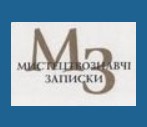ФОРТЕПІАННА ТВОРЧІСТЬ БОРИСА КУДРИКА ДЛЯ МОЛОДІ В КОНТЕКСТІ МУЗИЧНОЇ КУЛЬТУРИ ГАЛИЧИНИ ПЕРШОЇ ТРЕТИНИ ХХ СТОЛІТТЯ
BORYS KUDRYK’S PIANO COMPOSITIONS FOR YOUNG PEOPLE IN THE CONTEXT OF MUSIC CULTURE OF GALICIA IN THE FIRST THIRD OF THE TWENTIETH CENTURY
Author(s): Nataliia ToloshniakSubject(s): Music, Sociology of Culture, Pre-WW I & WW I (1900 -1919), Interwar Period (1920 - 1939), History of Art
Published by: Національна академія керівних кадрів культури і мистецтв
Keywords: Borys Kudryk; piano works; works for young people; music culture of Galicia;
Summary/Abstract: The purpose of the study is to reveal the artistic and aesthetic, cognitive and didactic values of Borys Kudryk’s piano music for young people in the context of the creative achievements of the Galician compositional school of the first third of the 20th century. The research methodology is based on the following methods: retrospection, comparison, systematisation, analysis, and generalisation.The scientific novelty of the obtained results is that for the first time the piano heritage of Borys Kudryk is considered in the axiological perspective of the contribution of his works to the regional pedagogical repertoire for piano.Conclusions. The article proves the statement: the piano music of Borys Kudryk is marked by a certain eclecticism, it is more imbued with the achievements of past eras than the contemporary art world. Nevertheless, the artistic, aesthetic, cognitive and didactic value of the analysed works of the composer for young people lies in their ideological, semantic and figurative-emotional content, which is determined by the range of genre rhythmic intonations inherent in the Galician socio-cultural environment of the late 19th and early 20th centuries and assimilated according to the author's preferences. Taking into account the achievements of the world musical culture in this field, rethinking this material through the prism of national song sources and local musical traditions, B. Kudryk presented works that tend to classicist stylistics and partially to neoclassical and post-Romantic ones. They occupy a distinctive niche in the diversity of Galician piano literature, which in the first third of the 20th century professed the principles of training young musicians who would not only master the instrument with dignity, but also respect national and universal artistic values, grow up to be emotionally sensitive and intellectually rich people.
Journal: Мистецтвознавчі записки
- Issue Year: 2023
- Issue No: 43
- Page Range: 134-138
- Page Count: 5
- Language: Ukrainian

